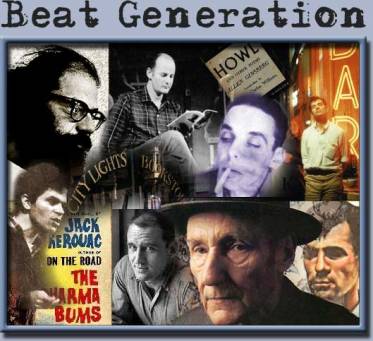
|
LITR 4533: |
|
|
Genre Presentation 2004 |
The
Beat Generation
By
Bryan Hyde

“I
like too many things and get all confused and hung-up running from one falling
star to another till I drop. This is the night, what it does to you. I had
nothing to offer anybody except my own confusion.”
 —Jack
Kerouac
—Jack
Kerouac
Definition:
“A group of American poets and novelists who were active and
influential in the late 1950’s, Beat writers rejected the prevailing socials
mores. Feeling oppressed by the
dominant culture, they held and publicly advocated anti-intellectual,
antipolitical, and, in general, antiestablishment views.
Beat not only referred to
feelings of oppression (“beaten down”) but also to a desired, “beatific”
state or vision of ecstasy. Beat
writers tended to express their alternative values through the form of their
writing, which, compared to more conventional modern works, has a very loose
structure and uses a great deal of slang” (The Bedford Glossary of Critical
and Literary Terms).
Notable
Examples:
On
the Road
by Jack Kerouac
“Howl”
by Allen Ginsberg
Naked
Lunch
by William S. Burroughs
One
Flew Over the Cuckoo’s Nest
by Ken Kesey
Subject
Genre:
Expressionist Poetry and Fiction
Expressionism:
Expressionists reject realism and share the impressionist intention to present a
personal vision through art. To
render this personal vision artistically, expressionists depict their subjects
as they feel or sense or experience them rather that as those subjects appear
objectively. To expose
idiosyncratic and often extreme states of human consciousness and emotion,
expressionist works tend to oversimplify and distort (The Bedford Glossary of
Critical and Literary Terms).
Representational
Genre:
Narrator in Poetry; Narrator + Dialogue in Fiction
Narrative
Genre:
The works of the Beats typically are romances.
They explore the journey toward enlightenment and transcendence.
However, there are elements of comedy and satire.
Example
of romance:
 “So
in America when the sun goes down and I sit on the old broken-down river pier
watching the long, long, skies over New Jersey and sense all the raw land that
rolls in one unbelievable huge bulge over to the West Coast, and all that road
going, all the people dreaming in the immensity of it, and in Iowa I know by now
the children must be crying in the land where they let children cry, and tonight
the stars'll be out, and don't you know that God is Pooh Bear? the evening star
must be drooping and shedding her sparkler dims on the prairie, which is just
before the coming of complete night that blesses the earth, darkens old rivers,
cups the peaks and folds the final shore in, and nobody, nobody knows what's
going to happen to anybody besides the forlorn rags of growing old, I think of
Dean Moriarty, I even think of Old Dean Moriarity the father we never found, I
think of Dean Moriarity.”
“So
in America when the sun goes down and I sit on the old broken-down river pier
watching the long, long, skies over New Jersey and sense all the raw land that
rolls in one unbelievable huge bulge over to the West Coast, and all that road
going, all the people dreaming in the immensity of it, and in Iowa I know by now
the children must be crying in the land where they let children cry, and tonight
the stars'll be out, and don't you know that God is Pooh Bear? the evening star
must be drooping and shedding her sparkler dims on the prairie, which is just
before the coming of complete night that blesses the earth, darkens old rivers,
cups the peaks and folds the final shore in, and nobody, nobody knows what's
going to happen to anybody besides the forlorn rags of growing old, I think of
Dean Moriarty, I even think of Old Dean Moriarity the father we never found, I
think of Dean Moriarity.”
--On the Road by Jack Kerouac
Example
of humor:
“A
simopath . . . is a citizen
convinced he is an ape or other simian. It is a disorder peculiar to the army
and discharge cures it"
--Naked
Lunch by William S. Burroughs

Example
of satire:
“Said
the Presidential skeleton
I
won't sign the bill
Said
the Speaker skeleton
Yes
you will
Said
the Representative skeleton
I
object
Said
the Supreme Court skeleton
Whaddya
expect”
--“The Ballad of the Skeletons” by Allen Ginsberg

Questions:
1.
During their time, the Beats were misunderstood and parodied.
Now, their work is respected and anthologized.
Why do you think attitudes have changed?
2. How
would American Literature, particularly poetry, have evolved differently if the
Beat movement had not occurred?
3.
What issues are brought up in some of the works of the Beats?
